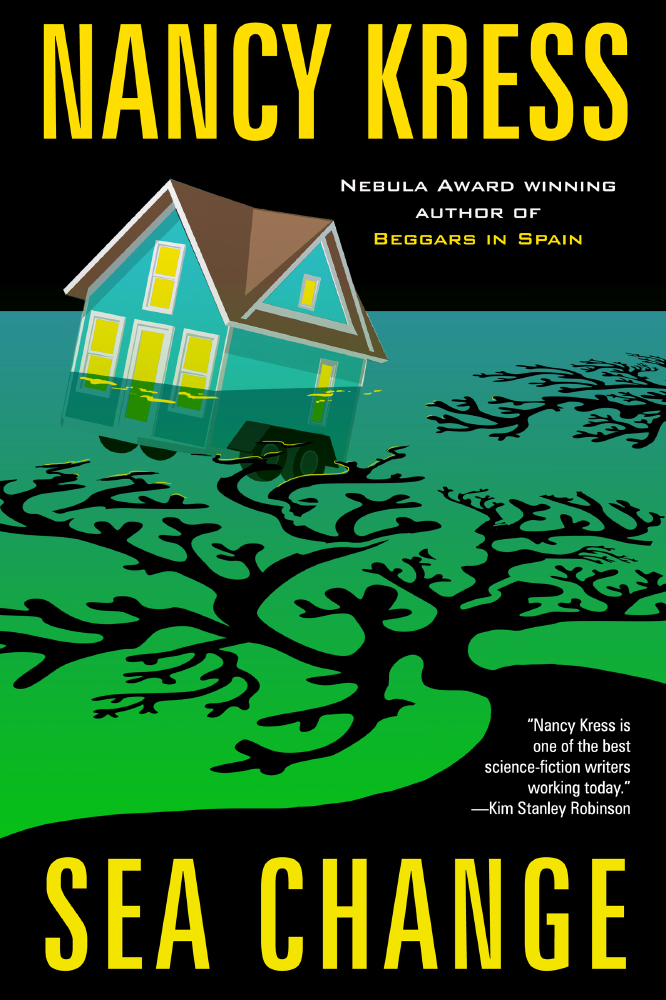Author of Sea Change Nancy Kress exclusively revealled to Female First her inspirations finding the cause, adding her character, and her heroine for her new book and how she is 'saving the planet one carrot at a time'.

Sea Change
I’m always a little suspicious when writers assert confidently their one specific source of inspiration for a given story. Fiction comes from a deep well within each writer, a well filled with everything one has experienced, seen, read, heard, thought about, all sloshing around down there and cross-breeding like some promiscuous water-borne micro-organisms. With luck, the combinations spawn a story.
In the case of my novella Sea Change, however, I can identify the three things that moved me to write this story. For me, not only is this atypical, but the elements floated into mind in an order atypical for me.
The first was a cause I believe in. Starting with a cause is dangerous, because it can lead to a polemic rather than a story. The way around this is to present your cause, first, in terms of how it affects your character (and it had better do so deeply, viscerally, urgently). Second, present your cause in a balanced way, showing not just the pluses but also the minuses. There is, after all, no free lunch.
The cause that interests me is genetically altered crops. There is a huge prejudice among many people against GMOs, mostly because there is so much disinformation out there. For hundreds of years agriculturists have cross-bred strains of crops and even different species (tangelos, anyone?) Genetic engineering just does it faster and more reliably. Is it “natural”? No. Neither is putting antibiotics into your body to cure plague. Or transplanting a heart from one body to another.
My passionate belief in GMOs comes from knowing how necessary they will be to feeding the world in the future, particularly poor countries. Rising temperatures and increased flooding of coastal growing areas, plus a growing global population, all make food insecurity a problem that is not going to go away. Already, the UN estimates, 10% of the world suffers from chronic hunger, and a disproportionate number of them are women and children. Crops engineered for greater yields and changing growing conditions can and will help.
However, this new technology, like all technologies, comes with risk. I wanted to portray that, too, in my story. So I went large, creating a worst possible scenario as backstory.
A cause, however, is not a story. Fiction happens to people, and the second inspiration for Sea Change is my protagonist, Renata. I wanted to write about an older woman, one who has known heartbreak, because I get tired of brash young badass heroines. Renata is an idealist, but one who recognizes that realizing ideals happens slowly, with effort, and imperfectly. And, sometimes, at great personal cost.
The third inspiration for my novella is the beautiful Washington State coast. I am a Seattleite transplanted from New York and the Pacific coast just ravishes me, especially the Quinalt Peninsula, which contains the world’s only temperate rainforest. A section of the coast belongs to a Native American tribe, the Quinalt Nation, and so they, too, are part of my story. For this, I had the help of a Native American sensitivity reader. The Quinalt, who have occupied their land for 1,000 years, depend heavily on salmon fishing, which is threatened by modern agricultural run-off.
It’s a lot to fit into one novella. But this is a story I truly felt inspired to write.
Nancy Kress
Published: May 2020
Paperback and Digital Books
New from the Nebula Award winning author of Beggars in Spain: A riveting climate-change technothriller of espionage, conspiracy, and hope. In this environmental page-turner, activist lawyer Renata Black—covert member of the Org—must go deep underground to unravel the truth behind the ecological disaster that has paralyzed the food industry and destroyed her family.
“Sea Change is like liquid nitrogen ice cream—a chilling treat.”
—Greg Bear, author of Eon and Take Back the Sky
Tagged in Books

